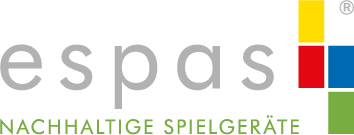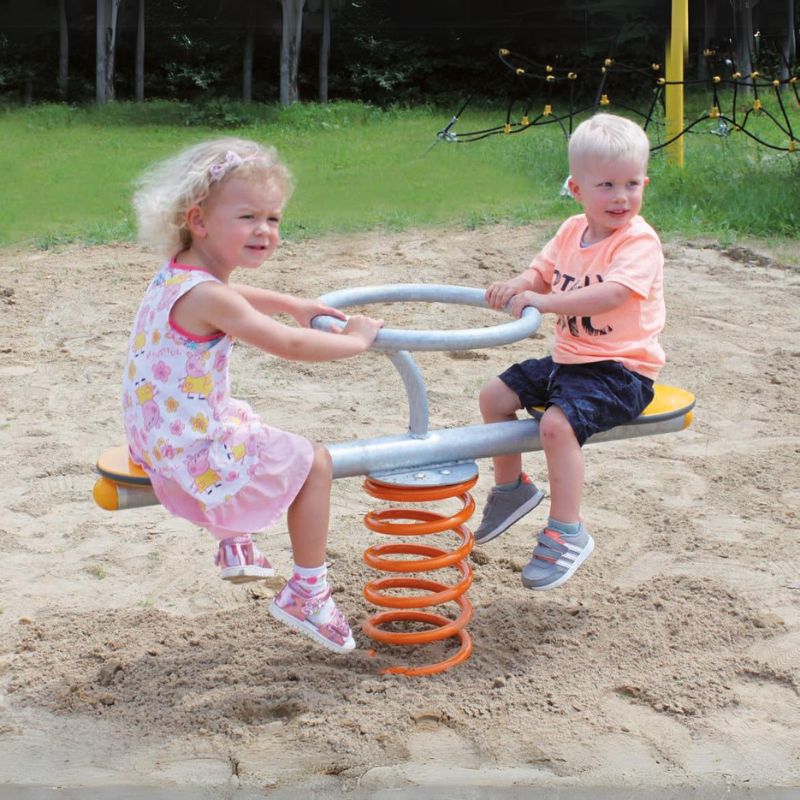
Around the playground
Safe play equipment, safe playgrounds
Movement is crucial for children's development, both in terms of motor skills and for developing healthy self-confidence.
Playgrounds provide an ideal environment for this. But who is liable if something happens?
Responsibilities for playground safety are regulated by the legislature in Section 823 of the German Civil Code (BGB). This stipulates that the person or institution operating a playground is responsible for technical safety and is liable in the event of damage if they violate the regulations. These regulations include protective laws such as the Product Safety Act and the playground standards EN 1176 and 1177.
The Product Safety Act (ProdSG) primarily applies to manufacturers of playground equipment. Section 4 of the ProdSG regulates the technical safety of playground equipment. Play equipment may only be placed on the market if it complies with recognized technical standards. These standards, in turn, are described in theplayground standards EN 1176 and 1177.
Safety first
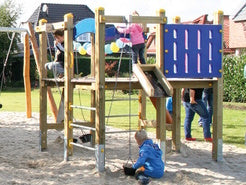
Regular checks on the playground
According to EN 1176 Part 7, all operators of publicly accessible playgrounds are obligated to ensure safety through regular inspections, maintenance, and repairs. This includes not only the general cleanliness of the playground, but also the maintenance and care of the play equipment, the surface, and the vegetation.
Specifically, the playground standard EN 1176 Part 7 prescribes the following controls:
- A daily to weekly visual inspection is required to detect obvious hazards caused by vandalism, use, or weather conditions. These include, for example, contaminants such as animal droppings, broken glass, sharp edges, and damaged parts.
- An operational inspection is carried out every one to three months to examine the playground and its play equipment in more detail for wear and tear and equipment stability.
- A major annual inspection is conducted , during which the condition of the playground equipment, foundations, and surfaces is thoroughly examined. All changes, such as corrosion, rot, and wear, as well as the inspections themselves, are documented, often in photographs, so that the playground's safety measures can be continuously monitored.
The more intensively a playground is used, the more frequently it should be inspected. Particular attention should be paid to dynamic playground equipment, such as zip lines.
In order to avoid playground accidents caused by defects, it is important to ensure that inspections are carried out by well-trained, qualified personnel.
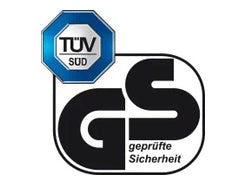
Elimination of defects
The operator is responsible for rectifying any defects. Minor damage should be repaired immediately, and wear parts should be replaced promptly. If the damage is so extensive that a piece of playground equipment must be shut down until repaired, it should be completely enclosed with a construction fence at least two meters high.
Protection against the consequences of damage
When you choose espas playground equipment, you can be assured that it has been developed and manufactured according to the highest safety and quality standards. All of our playground equipment is TÜV-certified according to EN 1176, the European standard for playgrounds and playground equipment. They are also weatherproof and vandal-proof, ensuring you and your children can enjoy them for a long time.
Until an espas piece of playground equipment is installed on your playground, espas is responsible for its safety. Before the playground equipment is put into operation, you will receive maintenance and inspection instructions. Installation of the equipment will then begin. All of our equipment is largely pre-assembled, allowing for quick and easy on-site installation.
Immediately after installation, the play equipment must be inspected by a person certified according to DIN 79161. This person determines whether all safety requirements are met.
Only after the playground equipment has been accepted is it your turn as the operator to ensure regular maintenance and inspection in accordance with EN 1176 Part 7.
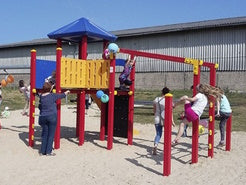
Safety increases the fun
Children need a variety of physical activities to develop their motor skills through play. Play equipment in its many variations is ideal for this. It trains their sense of balance and coordination. At the same time, it arouses children's curiosity and motivates them to try new things. In doing so, they continually push themselves to their limits and sometimes even beyond them. Therefore, operating a playground always involves certain risks. This makes it all the more important that the playground, including the play equipment, meets legal road safety requirements and that everything functions properly and is maintained in good condition.
